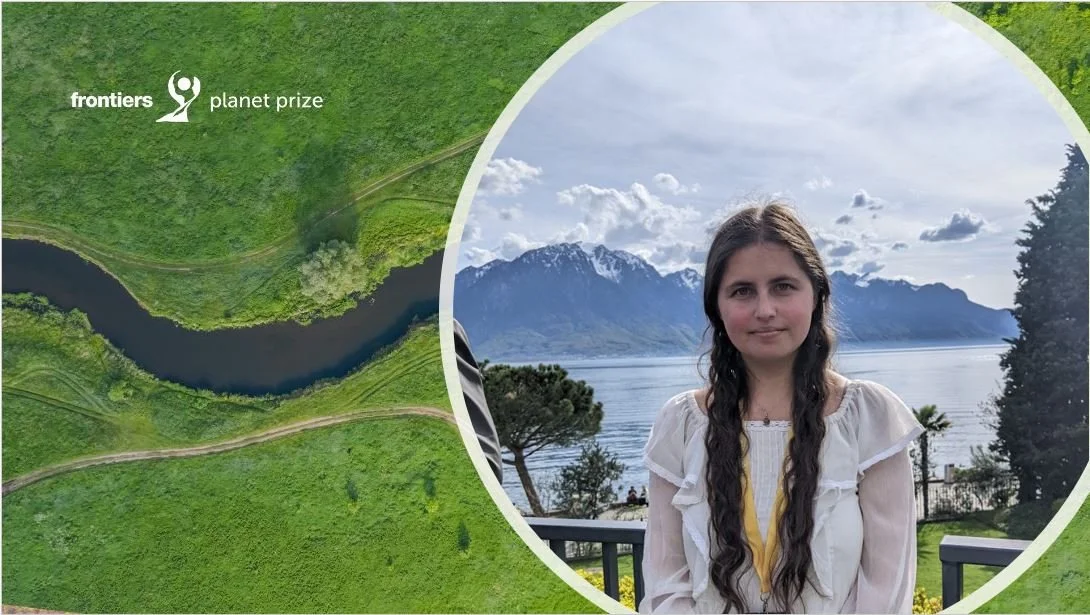News on the Frontiers Planet Prize

Unveiling the Hidden Crisis: Climate Change and Tree Fecundity
Michał Bogdziewicz from Adam Mickiewicz University, National Champion of Poland, shares the pioneering insights from his research regarding the crucial role of tree fecundity in forest regeneration, and how these insights should be implemented in forest management to ensure forests continue to provide essential services to ecosystems and to human society.
The Recovery of European Freshwater Biodiversity Has Come to a Halt
Peter Haase from the Senckenberg Society for Nature Research and University of Duisburg-Essen, National Champion of Germany, presents the results of his research on European freshwater biodiversity, demonstrating that legislative measures can promote recovery in freshwater ecosystems, and should be pursued more stringently in the future.
The Quest for a Global Vegetation Science
Francesco Sabatini from the University of Bologna, National Champion of Italy, presents his novel approach to studying global plant community distribution and outlines how this approach can help formulate better predictions of future vegetation worldwide.
Bringing the Planet Back to the Safe Operating Space by Controlling Nutrient Pollution to Lakes
Olga Tammeorg from the University of Helsinki, National Champion of Finland, shares her thoughts on how controlling nutrient pollution in lakes can bring us back to the safe operating space of our planet.
The Significance of Solid Chemical Catalysts in Global Decarbonization Efforts
Alexandra Velty from Universitat Politècnica de València, National Champion of Spain, explores the potential that solid chemical catalysts hold for the development of efficient and green catalytic processes, as an important part of global decarbonization efforts and healthier planetary development.
How Can We Design Environmentally Effective and Politically Appealing Carbon Pricing Policies?
Daniel Muth from HUN-REN centre for economic and regional studies, National Champion of Hungary, shares his insights on how we can modify existing carbon pricing policies to make them more environmentally effective and politically appealing.
Navigating the Safe Operating Space with Novel Plant-based Meat and Dairy Alternatives
Marta Kozicka from the International institute for Applied Systems Analysis, National Champion of Austria, shares her thoughts on how a dietary shift towards plant-based meat and dairy alternatives, in combination with land-use policy measures, can significantly contribute to returning to a safe operating space.
River Restoration as a Tool for Climate Mitigation by Reducing River Methane Emissions
Gerard Rocher-Ros from the Swedish University of Agricultural Sciences and Umeå University, National Champion of Sweden, explains how river restoration can contribute to the reduction of methane emissions and effectively contribute to the sustainability of our society within the planetary boundaries.
Photography and Storytelling to Highlight Knowledge Hierarchies, and Foster Learning from Existing Ocean Stewardships
Mia Strand from Nelson Mandela University, National Champion of South Africa, explains why we should include socio-cultural dimensions in ocean governance processes, and presents how arts-based participatory research led by indigenous and local communities can be used to enhance environmental stewardship for a more sustainable future.
Understanding the Relationship Between Arctic Sea Ice Loss and Planetary Boundaries
Seung-Ki Min from Pohang University of Science and Technology, National Champion of South Korea, explores how Arctic Sea ice is impacted under different emissions scenarios, and shares why emissions reduction policies are required to mitigate the potential collapse of multiple planetary boundaries and prevent adverse effects on ecosystems and human societies worldwide.
Thin Green Skin Covering Permafrost – Yet Another Reason to Care About Arctic Vegetation
Gabriela Schaepman-Strub from the University of Zurich, National Champion of Switzerland, together with first author of the winning article, Jacqueline Oehri from McGill University, share their research results highlighting the important functions that the Arctic tundra ecosystem plays within climate change, biosphere integrity, and land-system change. They also call for careful management and protection of functionally critical areas in the Arctic as important actions for the health of our planet.
A Need for a Paradigm Shift in Planetary Health Science
Jason Rohr from the University of Notre Dame, National Champion of the United States of America, describes his study where aquatic vegetation from water points in West Africa was removed and converted to compost, providing economic incentives and co-benefits for public health and agriculture and demonstrating that planetary health innovation can simultaneously addresses numerous SDGs.
The Ocean and Us: A Broader Perspective
Alexander Turra from the University of São Paulo, National Champion of Brazil, shares his novel perspective on the relationship between ocean health and society, and suggests new routes to identify and face the sources of marine litter and environmental contamination at large.
Building Tomorrow: Bridging Toward Carbon Neutrality in Construction Emissions
Mustafa Şahmaram from Hacettepe University, National Champion for Turkey, shares his innovative research on how enabling the reuse of construction and demolition wastes materials by subjecting them to an accelerated CO2 treatment can reduce the high environmental burdens of the construction sector, specifically regarding climate change.
The Greenland Ice Sheet - Not Just a Victim, but Also Part of a Cure for Global Warming
Minik Rosing from the University of Copenhagen, National Champion of Denmark, shares his thoughts on how we can utilize the potential of Greenland’s glacial rock flour as part of a global solution for climate, biodiversity, and for addressing food security challenges.
Unraveling the Drivers of Biodiversity Loss: A Global Synthesis for Sustainable Action
Pedro Jaureguiberry from Instituto Multidisciplinario de Biología Vegetal and Universidad Nacional de Córdoba, National Champion of Argentina, shares his thoughts on the human drivers that directly influence various dimensions of biodiversity—from genes and species to ecosystems, and how to effectively mitigate them using policy.
A Pesticide Odyssey
Federico Maggi from The University of Sydney, National Champion of Australia, along with his winning article's co-authors Fiona H.M. Tang from Monash University and Francesco N. Tubiello from the Food and Agriculture Organization of the United Nations in Italy, share their thoughts on the kind of research required to find innovative solutions to the global contamination challenge. They particularly highlight their research results on pesticide contamination.
New Methods to Measure the Real-World Impacts of Ocean Acidification on Marine Species and Ecosystems Will Increase Local Climate Resilience and Adaptation
Steve Widdicombe from Plymouth Marine Laboratory, National Champion of the United Kingdom, describes a new approach for quantifying the biological impacts of ocean acidification on species and ecosystems across regional and global scales, and how it helps to generate data needed to increase local climate resilience and adaptation.
Maintaining Reef Connectivity is Crucial to Protect Reefs Worldwide
Ariel Greiner from Pennsylvania State University and the University of Oxford, first author of the winning article of Canada, 2023, together with Emily Darling from the Wildlife Conservation Society and the University of Toronto, Marco Andrello from the Institute for the study of Anthropic impacts and Sustainability in the marine environment, and Marie-Josée Fortin from the University of Toronto, National Champion of Canada, 2023, share their thoughts on why maintaining reef connectivity is crucial for protecting the important ecosystems of coral reefs worldwide.
Ammonia: A Cost-Effective Priority for Cleaner Air
Baojing Gu from Zhejiang University, International Champion of China for the 2023 edition of the Frontiers Planet Prize, discusses why managing nitrogen emissions is essential for maintaining safe planetary boundaries and safeguarding public health in urban environments, and outlines a cost-effective strategy for reducing ammonia emissions and contributing to cleaner air.





















